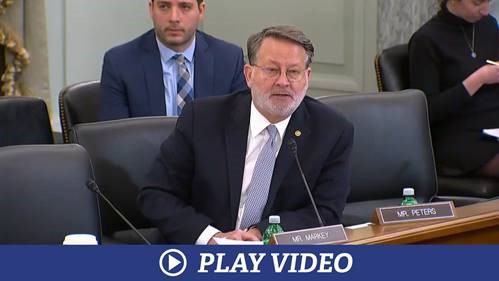VIDEO: Peters Highlights Urgent Need to Pass CHIPS Act Funding into Law
Peters Participates in Commerce Committee Hearing Examining the Relationship Between American Innovation, Competitiveness and Semiconductors
WASHINGTON, DC – Today, the U.S. Senate Committee on Commerce, Science, and Transportation, where U.S. Senator Gary Peters (MI) is a member, held a hearing to highlight the importance of funding the CHIPS Act through the U.S. competitiveness bill to boost U.S. semiconductor manufacturing and bolster innovation across a variety of industries that rely on these critical technologies. During the hearing titled “Developing Next Generation Technology for Innovation” – Peters stressed the importance of semiconductor technologies to the future of mobility, and the urgent need to pass CHIPS Act funding to strengthen domestic production and address the ongoing shortage that has hurt auto industries including in Michigan. Peters also emphasized the value Michigan offers to the semiconductor industry through its auto industry, robust STEM education and skills training programs, and world-class workforce. During the hearing, Peters talked about the upcoming field hearing he is convening titled “Made in America: The Future of Automotive Innovation and Semiconductor Chips.” It will examine how Congress can help bolster U.S. innovation for electric and autonomous vehicles by increasing domestic production of semiconductor chips and other technologies, while also delivering economic, environmental, and safety benefits for the American people. The field hearing will take place on Monday, March 28th at the Detroit Regional Chamber.
The Creating Helpful Incentives to Produce Semiconductors (CHIPS) for America Act, which Congress previously passed into law, established federal incentives for domestic semiconductor chip production to expand American manufacturing and supply chains – helping create good-paying jobs, reinforce our global competitive edge, and strengthen our supply chain resiliency. The U.S. competitiveness package that passed both the Senate and House of Representatives included $52 billion in funding for the CHIPS Act to bolster U.S. semiconductor production. Congress must now work to finalize the competitiveness the bill, negotiating differences between the House and Senate-passed bills.
“Semiconductor chips can be as small as a fingernail, but we know that these tiny devices have absolutely enormous impact across the economy and our society, and certainly a clear example is the auto industry,” said Senator Peters. “As we look to the future, chips are going to play an even more important role in mobility, as they are central for both electric vehicles as well as autonomous vehicles, which represents the future for the auto industry. That's why I'm excited to chair a hearing in Detroit this coming Monday… to examine the role of semiconductors in the future of automotive innovation. I certainly believe it's essential that we make our semiconductor supply chains as resilient as possible, not just efficient, but highly resilient, and I think my state of Michigan is particularly well positioned to lead this this effort. Not only will this grow jobs and economic activity in the semiconductor industry, it will also strengthen the entire economy, especially when it comes to not just cars, but all products that use these chips.
“…Michigan knows how to make things, so it's no surprise we're seeing a major influx of investment around semiconductor technologies like KLA operating its second headquarters in Ann Arbor. Without a doubt in my mind, funding for the CHIPS Act will be critical for growing this forward.”
To watch video of Senator Peters’ remarks, click here.
Peters has repeatedly pressed for action and led efforts to address the ongoing semiconductor shortage that has stymied automotive innovation in recent years, and impacted workers and industries across the country – including the Michigan auto industry. Peters secured multiple provisions in the U.S. competitiveness package that passed both the Senate and House of Representatives to bolster U.S. semiconductor production, including to create a $2 billion supplemental incentive fund to support the domestic production of mature semiconductor technologies in the coming years and ensure that semiconductor projects that support critical manufacturing industries are given priority status, which would include the automotive sector. This is in addition to $50 billion already in the bill to incentivize the production of semiconductors of all kinds in the U.S.—for a total of $52 billion.
The competitiveness bill also includes Peters’ bipartisan Investing in Domestic Semiconductor Manufacturing Act, which would ensure that federal incentives to boost domestic semiconductor manufacturing include U.S. suppliers that produce the materials and manufacturing equipment that enable semiconductor manufacturing. In doing so, the legislation strengthens the supply chain for semiconductors and bolsters Michigan manufacturers. The package also authorizes increased funding for the Manufacturing Extension Partnership program, which has been a priority for Peters.
Additionally, Peters has raised this supply chain disruption with numerous Biden Administration officials in conversations both before and after President Biden took office – including during a roundtable discussion with Commerce Secretary Gina Raimondo in Michigan. Peters has also introduced and advanced bipartisan legislation in the Senate to streamline federal efforts to strengthen and expand domestic manufacturing of semiconductor chips, and bolster American semiconductor production and supply chains.
###
